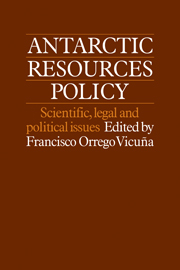Book contents
- Frontmatter
- Contents
- List of contributors
- 1 Antarctic resources policy: an introduction
- Part one The state of Antarctic knowledge and experience
- Part two The policy for the conservation of the living resources of Antarctica
- Part three The policy for the exploration and exploitation of the mineral resources of Antarctica
- 11 Geologic data and its impact on the discussion on a regime for mineral resources
- 12 Basic conditions for the exploration and exploitation of mineral resources in Antarctica: options and precedents
- 13 Oil as a special resource: problems and experiences
- 14 An overview of the problems which should be addressed in the preparation of a regime governing the mineral resources of Antarctica
- 15 The definition of a regime on Antarctic mineral resources: basic options
- 16 Criteria for access to the resources of Antarctica: alternatives, procedure and experience applicable
- Part four Issues on Antarctica and the law of the sea
- Part five The policy for Antarctic cooperation
14 - An overview of the problems which should be addressed in the preparation of a regime governing the mineral resources of Antarctica
Published online by Cambridge University Press: 06 July 2010
- Frontmatter
- Contents
- List of contributors
- 1 Antarctic resources policy: an introduction
- Part one The state of Antarctic knowledge and experience
- Part two The policy for the conservation of the living resources of Antarctica
- Part three The policy for the exploration and exploitation of the mineral resources of Antarctica
- 11 Geologic data and its impact on the discussion on a regime for mineral resources
- 12 Basic conditions for the exploration and exploitation of mineral resources in Antarctica: options and precedents
- 13 Oil as a special resource: problems and experiences
- 14 An overview of the problems which should be addressed in the preparation of a regime governing the mineral resources of Antarctica
- 15 The definition of a regime on Antarctic mineral resources: basic options
- 16 Criteria for access to the resources of Antarctica: alternatives, procedure and experience applicable
- Part four Issues on Antarctica and the law of the sea
- Part five The policy for Antarctic cooperation
Summary
Introduction
At the heart of the current negotiations about a minerals regime for Antarctica lie two, or perhaps three, issues of very great difficulty. They may not be as complex as, say, the problems that faced the recently concluded United Nations Conference on the Law of the Sea when it decided, unwisely some would now say, to produce a complete and detailed code governing every aspect of deep-sea-bed mining. But the intellectual challenge facing the negotiators in the Antarctic context is probably greater. In the case of each of the hard issues, the gulf between the opposing opening bids is a huge one. Solutions, if they are to be found, will have to reconcile political and legal positions which look – at first glance and second glance as well – to be wholly irreconcilable. To produce those solutions will call for imagination, ingenuity, hard work and a great deal of the quality of forbearance to which Dr John Heap directed our attention in one of the earlier papers presented to this Conference (Chapter 6).
The areas of agreement
Before commenting briefly on these central and difficult issues, it may be useful to look at areas of agreement among the Consultative Parties which have either been recorded or are in the process of emerging. Recommendation XI-1, which was adopted at the Consultative Meeting held in Buenos Aires in mid-1981 and which forms the basis of the current negotiations on minerals, established common ground on a significant number of points.
Information
- Type
- Chapter
- Information
- Antarctic Resources PolicyScientific, Legal and Political Issues, pp. 191 - 198Publisher: Cambridge University PressPrint publication year: 1983
Accessibility standard: Unknown
Why this information is here
This section outlines the accessibility features of this content - including support for screen readers, full keyboard navigation and high-contrast display options. This may not be relevant for you.Accessibility Information
- 2
- Cited by
